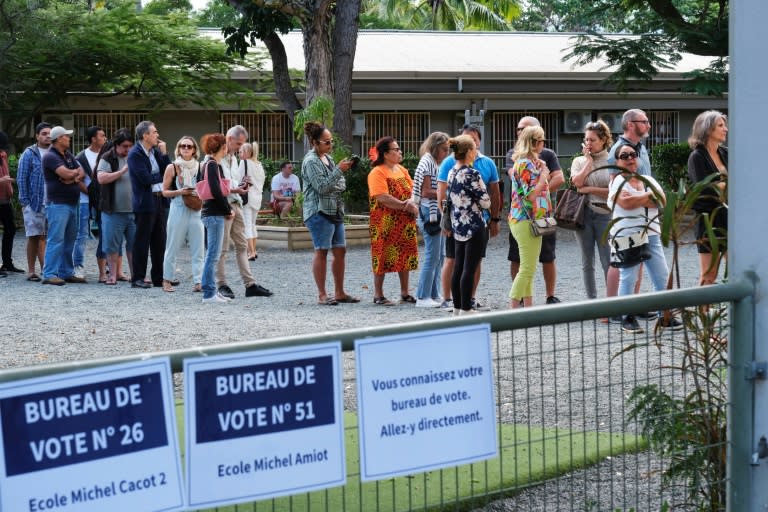France votes in pivotal snap polls as far right eyes power

French people voted on Sunday in the first round of high-stakes snap parliamentary elections which could see the far-right party of Marine Le Pen take power in a historic first.
With Russia's war against Ukraine in its third year and energy and food prices much higher, support for the anti-immigration and eurosceptic National Rally (RN) party has surged despite President Emmanuel Macron's pledges to prevent its ascent.
The vote could put the far-right in power in France for the first time since the Nazi occupation in World War II.
Polling stations opened across mainland France at 8:00 am (0600 GMT) and will close 12 hours later, immediately followed by projections that usually predict the result with a degree of accuracy.
Voters in France's overseas territories that span the globe cast ballots earlier in the weekend. Some 49 million people are eligible to vote.
"These are not easy elections, the results are very uncertain, and the repercussions could be serious for society", said Julien Martin, a 38-year-old architect in the southwestern city of Bordeaux.
Voters lined up to cast their ballots in France's Pacific territory of New Caledonia, where tensions remain high following last month's deadly riots.
The vote is "decisive", said Cassandre Cazaux, a nurse.
"It should be well attended, but I don't know if everyone will play along and come out to vote," Cazaux added.
By midday local time, turnout in the archipelago, which is located between Australia and Fiji, stood at 32.4 percent, compared to 13.06 percent recorded during the 2022 legislative polls.
Former president Nicolas Sarkozy, Greens party leader Marine Tondelier and former prime minister and Macron ally Edouard Philippe were among the first high-profile politicians to vote.
Philippe, the mayor of Le Havre in northern France who has made little effort to hide his ambitions for the presidency, was seen smiling and chatting to locals on Sunday morning.
Elections for the 577 seats in the National Assembly are a two-round process. The shape of the new parliament will become clear after the second round on July 7.
Most polls show the RN on course to win the largest number of seats in the National Assembly, parliament's lower house, although it remains unclear if the party will secure an outright majority.
Final opinion polls have given the RN between 35 percent and 37 percent of the vote, against 27.5-29 percent for the left-wing New Popular Front alliance and 20-21 percent for Macron's centrist camp.
If the RN obtains an absolute majority, party chief Jordan Bardella, Le Pen's 28-year-old protege with no governing experience, could become prime minister in a tense "cohabitation" with Macron.
Many analysts say that France is facing a hung Assembly, which could lead to deadlock and political instability.
- 'Fight against hatred' -
Macron's decision to call the snap vote after the RN's strong showing in European Parliament elections this month stunned friends and foes and sparked uncertainty in Europe's second-biggest economy.
The Paris stock exchange suffered its biggest monthly decline in two years in June, dropping by 6.4 percent, according to figures released on Friday.
In an editorial, French daily Le Monde said it was time to mobilise against the far right.
"Yielding any power to it means nothing less than taking the risk of seeing everything that has been built and conquered over more than two and a half centuries gradually being undone," it said.
Wielding mops and buckets, several activists of the Femen feminist collective dressed as cleaners on Saturday demonstrated bare-breasted at the Trocadero in Paris, chanting slogans against the extreme right.
Separately, more than 100,000 joined an LGBTQ Pride march in Paris, with some carrying placards targeting the far right.
"I think it's even more important right now to fight against hatred in general, in all its forms," said 19-year-old student Themis Hallin-Mallet.
- Spike in hate speech -
Many have pointed to a spike in hate speech, intolerance and racism during the charged campaign. A video of two RN supporters verbally assaulting a black woman has gone viral in recent days.
Macron has deplored "racism or anti-Semitism".
He apparently hoped to catch political opponents off guard by presenting voters with a crucial choice about France's future, but observers say he might have lost his gamble.
Support for Macron's centrist camp has collapsed, while left-wing parties put their bickering aside to form the New Popular Front, in a nod to an alliance founded in 1936 to combat fascism.
Analysts say Le Pen's years-long efforts to clean up the image of a party co-founded by a former Waffen SS member have been paying off.
The party has promised to bolster purchasing power, curb immigration and boost law and order.
A defiant Macron has stood by his decision to call the elections, while warning voters that a win by the far right or hard left could spark a "civil war".
bur-as/cw

 Yahoo News
Yahoo News 
